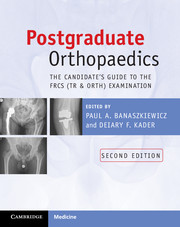Book contents
- Frontmatter
- Contents
- Contributors
- Foreword
- Preface to second edition
- Abbreviations
- Section 1 The FRCS (Tr & Orth) examination
- Section 2 The written paper
- Section 3 The clinicals
- Section 4 The adult elective orthopaedics oral
- Section 5 The hand oral
- Section 6 The paediatric oral
- Section 7 The trauma oral
- Section 8 The basic science oral
- Section 9 Miscellaneous topics
- Chapter 23 Surgical exposures oral core topics
- Chapter 24 Anatomy oral core topics
- Chapter 25 SAS doctors and the FRCS (Tr & Orth) exam
- Chapter 26 FRCS (Tr & Orth) and CESR (Article 14)
- Chapter 27 Candidates' accounts of the examination
- Chapter 28 Examination failure
- Index
- References
Chapter 26 - FRCS (Tr & Orth) and CESR (Article 14)
from Section 9 - Miscellaneous topics
- Frontmatter
- Contents
- Contributors
- Foreword
- Preface to second edition
- Abbreviations
- Section 1 The FRCS (Tr & Orth) examination
- Section 2 The written paper
- Section 3 The clinicals
- Section 4 The adult elective orthopaedics oral
- Section 5 The hand oral
- Section 6 The paediatric oral
- Section 7 The trauma oral
- Section 8 The basic science oral
- Section 9 Miscellaneous topics
- Chapter 23 Surgical exposures oral core topics
- Chapter 24 Anatomy oral core topics
- Chapter 25 SAS doctors and the FRCS (Tr & Orth) exam
- Chapter 26 FRCS (Tr & Orth) and CESR (Article 14)
- Chapter 27 Candidates' accounts of the examination
- Chapter 28 Examination failure
- Index
- References
Summary
A certificate confirming eligibility for specialist registration is awarded following a successful application under Article 14 of the General and Specialist Medical Practice order 2003 (Medical education, training and qualification). It is now processed by the GMC and it is a requirement for a doctor to be on the Specialist Register to be able to take up a substantive consultant appointment in the UK. Applicants will be measured against the standards of those who have successfully gained a certificate of completion of training (CCT). The test of knowledge required for a CCT is the Intercollegiate Fellowship Exam. All SASG (Specialty and Associated Specialty Grade) doctors working in the UK will be applying in the category of CESR Trauma and Orthopaedics where the applicant should have been awarded specialist qualification or 6 months of specialist training. Although fellowship exam is not mandatory, it is considered strong evidence of a current depth and breadth of orthopaedic knowledge and a valid reliable measure of good standard. It is extremely difficult otherwise to demonstrate this level of knowledge and skills.
The evaluation considers the training and/or qualifications, taking into account knowledge and experience. The evidence to be collected will be in the following domains: knowledge, skills and performance (75%), safety and quality (20%), communication, partnership and teamwork (5%) and maintaining trust (5%).
- Type
- Chapter
- Information
- Postgraduate OrthopaedicsThe Candidate's Guide to the FRCS (Tr and Orth) Examination, pp. 572 - 575Publisher: Cambridge University PressPrint publication year: 2012



